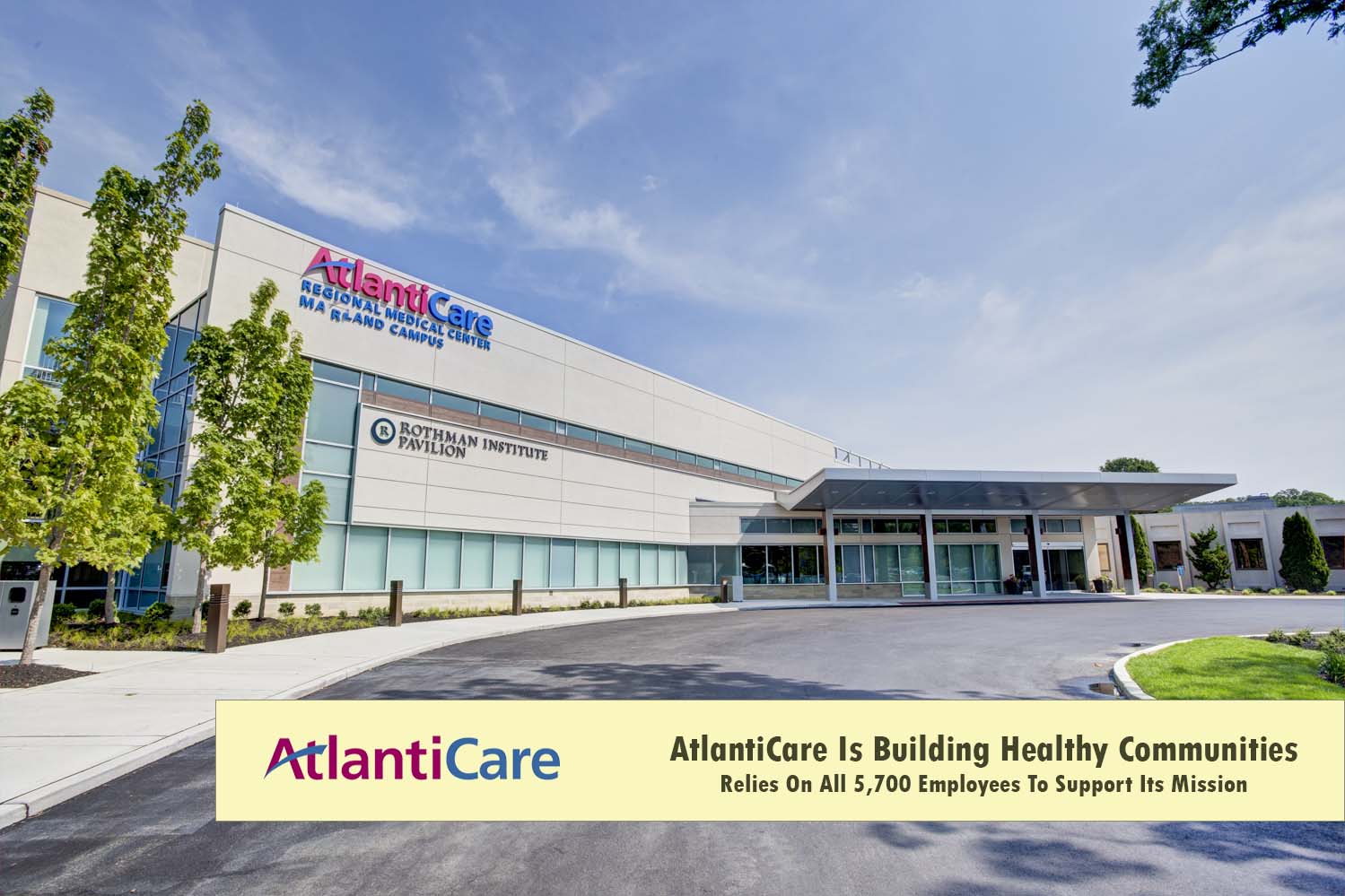Located in southern New Jersey, AtlantiCare, a member of Geisinger, is an organization that considers every employee at every level of the organization to be an important part of achieving the goal of helping patients reach optimal health. AtlantiCare relies on its nearly 5,700 employees to make a difference in health and healing, one person at a time. From a bedside nurse, to a cook preparing food, or a technician servicing computers, everyone plays an important role in building a healthy community. Employees respond well to being recognized as valuable parts of the team; in a recent company survey, 94% of AtlantiCare employees said that they would recommend working at AtlantiCare to friends or family.
AtlantiCare has been well recognized for how it takes care of employees and values each employee’s contributions. It has received many awards and designations, such as Diversity Inc. Top 12 Hospitals in the country award, 2017 Healthcare Equality Index Leadership in promoting LGBTQ patient centered care, New Jersey Business Outstanding Employer Award, and an American Heart Association award for its efforts to help employees improve their health and well-being.
AtlantiCare works with every employee to show them their importance to the organization. Each year, every employee gets a strategy map that assists them in identifying their annual goals. These strategy maps create a clear line of sight between the work of individuals and departments and the achievement of organizational strategic goals. All 5,700 employees can articulate how their strategy map aligns to the organization goals.
The system provides leadership development courses and programs to employees. For instance, “Pathways to Leadership” is targeted to employees who are not formal leaders, but have a goal to become one. The program is a 10-month process that combines classroom-based education, exposure to senior leaders, and special projects which support organizational goals. Higher level senior leaders mentor the project teams, which helps build employee networks and cross-department communication. Each team project is based on the organization’s performance excellence mandates: Best people, best quality, best growth, best customer experience, and best financial performance. Roseann Kobialka, assistant vice president of Organizational Development, states “AtlantiCare has always recognized that employee engagement is critical to the success of our company. When we are able to align the work that we do and the skills that we build around the needs of our community and our organizational direction, we attain the best of all outcomes: engagement, alignment and achievement.”
Another leadership program for newly hired or newly promoted leaders is “Foundations of Leadership,” which teaches behavioral skills and historical knowledge about the company. It is a 2-day immersion course, and clarifies organizational expectations of leaders. “Foundations” also introduces the new leader to important support departments such as legal, finance and human resources.
AtlantiCare, as part of its emphasis on personal and professional development, also offers a robust tuition reimbursement program for employees who go back to local colleges to obtain degrees or certifications.
For more than a decade, AtlantiCare has delivered Catalyst Learning’s School at Work (SAW®) and Expanding Your Career and Healthcare Opportunities (ECHO®) programs as an important first step in developing leaders in all parts of the company. Recently, AtlantiCare surveyed its many employees who had participated in SAW to evaluate their career growth, post-graduation. The survey found that:
- 37 percent of AtlantiCare’s SAW graduates now have more job responsibility.
- 39 percent have been promoted since graduating from SAW.
- 42 percent have changed departments since graduating from SAW.
- 9 percent went on to earn a professional certification.
- 21 percent went back to school to earn an associate degree.
- 31 percent returned to school and earned a bachelor’s degree.
“The SAW program makes you think about what you really want for your next opportunity or career path,” said one survey respondent. “It opens your eyes to how large the company is and how many avenues there are to take within it.”
Edison Feliciano, a former SAW graduate, found the courage to completely change careers within the company. After graduating, the operating room technician pursued a career in AtlantiCare’s Information Technology department, attaining a higher level of responsibility and compensation. Another SAW graduate, Wendy Carr, became the team leader of the Customer Service Support Team after graduation.
One of the most important SAW courses for AtlantiCare is Principles of Patient Safety and Satisfaction. This course helps employees to see how their work aligns with the HCAHPS survey, and how each employee can take ownership in making a positive impact and safer environment. It is more than just the DVD and workbooks, the discussions connect it to student’s day to day jobs.
AtlantiCare’s Ken Bishop has co-facilitated both the SAW and ECHO programs since the company first began using them. Bishop said AtlantiCare is committed to supporting its employees’ professional advancement and personal growth.
When classes begin, Bishop said, it’s clear that students are nervous. By the end of the program, however, they are standing in front of their classmates, making presentations and sharing newfound knowledge.
“I joke that they’ve grown three inches. It’s because their posture changes. You can see it in how they carry themselves and interact with each other,” Bishop said.
Bishop said enrolling in SAW or ECHO requires a certain amount of courage and vulnerability, especially for employees who have been in the workforce for years.
“These employees haven’t been in formal schooling for a while or they didn’t have any formal schooling after high school, yet they’ve been professionals for a number of years,” said Bishop. “Now we’re asking them to do something different, asking them to do something new, asking them to do something uncomfortable. Over the years I’ve been involved with SAW and ECHO, it’s been wonderful to see the growth that happens,” Bishop said.
